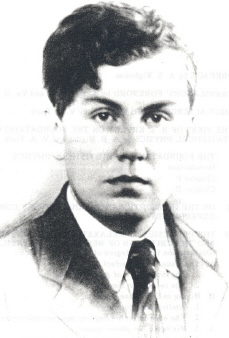
BIOGRAPHY OF N. S. KRYLOV
( 1917 - 1947 )
-
born Aug. 10, 1917, Ustyuzhna , Russia.
died June 21, 1947, Lenigrad , Russia.
|
|
BIOGRAPHY OF N. S. KRYLOV
|
Nikolay Sergeevich Krylov (10 August 1917 – 21 June 1947) was a Russian theoretical physicist known for his work on the foundations of statistical mechanics. He showed that a sufficient condition for a dynamical system to relax to equilibrium is for it to be mixing.
Krylov was born in Ustyuzhna (now in Vologda Oblast of Russia). He graduated from Leningrad University with a degree in physics. He then studied with Fock and wrote a thesis on the foundations of statistical mechanics entitled: Mixing Processes in Phase Space.
Nikolay Sergeevich Krylov published well known monograph:
N. S. Krylov,
Works on the Foundations of Statistical Physics
( Princeton University Press, Princeton, New Jersey, 1979).
The book was published in Russian in 1950.
V. A. Fock and A. B. Migdal editted Krylov's manuscripts and
drafts to transform them into a book after his death.
The evaluation of his ideas were made by:
1. Ya. G. Sinai, Developments of Krylov's Ideas, in:
N. S. Krylov, Works on the Foundations of Statistical Physics
( Princeton University Press, Princeton, New Jersey, 1979), p.239.
2. E. T. Jaynes, "Works on the Foundations of Statistical Physics" by N. S. Krylov, J. Am. Stat. Assn., 76, 742 (1981).
Nikolai Sergeevitch Krylov entered the Department of Physics at Leningrad University in 1934.
Even as a student he attracted general attention by his brilliant abilities and his desire through his own efforts
to get to the bottom of the problems of theoretical physics that interested him. This ability to concentrate on and to
penetrate into the object of his studies characterised Krylov throughout his scientific career, which began when he was
still a university student.
Krylov graduated in 1939 but even before this he had written two papers which were published in 1940. These are:
1. On the foundation of physical statistics;
2.On methods of obtaining Gibbs' distribution.
After graduating, he continued to undertake research at Leningrad University, advised by V. A. Fock. He presented his
candidate's thesis Mixing processes in phase space which he defended brilliantly in July 1941. Up to this
time Krylov had been little affected by World War II, but in 1941 the Germans invaded Russia and by September German
troops were on the outskirts of Leningrad cutting the city off from the rest of Russia. The city came under constant
artillery and air bombardment and Krylov was assigned air defence duties. However, he would invariably be seen reading
a book while on duty. It is quite incredible how he continued research, developing his ideas on statistical mechanics,
while subjected to appalling suffering from shortages of supplies. About 660,000 people died in Leningrad during the
siege from scurvy and starvation. The exceptionally bitter winter of 1941-42, when temperatures fell to -40 degrees C,
was one of extreme hardship for Krylov but he was evacuated and was able to recover his health in time to defend his
doctoral thesis in Kazan (where Leningrad University had moved because of the war) in the summer of 1942.
The blockade of Leningrad was broken in January 1943, but it was into 1944 before the German troops were forced back from the surroundings. Krylov certainly couldn't return to Leningrad so he spent time working at the scientific centres in Elabuga, Joshkar Ola, and Moscow. By the autumn of 1944 Leningrad was able to start the process of recovery (much had been destroyed by the bombardment and much of what remained was destroyed by the Germans before they retreated). Krylov resumed his duties at senior scientist at the Physical Institute of Leningrad University. By the end of 1946 his health had begun to deteriorate and after months of severe illness he died in June of the following year.
A S Wightman wrote in the Preface to the book of N. S. Krylov:
Krylov's place in the history of statistical mechanics is quite special. He came after the developments in
probability theory and ergodic theory of the first three decades of this century which represented the first major
impact of statistical mechanics on mathematics (the work of Poincare', Birkhoff, von Neumann, Hopf, Kolmogorov,
Khinchin, Wiener, ...). He tried, and in this he was ahead of his time, to re-examine the fundamental physical
issues of statistical mechanics in the light of these new mathematical insights.
L A Bunimovich writes in a similar way in 1987:
The outstanding Russian physicist N S Krylov died in 1947 at the age of 30. His works, in which he tried to
re-examine the fundamental problems of statistical mechanics in the light of developments in ergodic theory and
probability theory, were far ahead of his time. Some of his ideas still remain to be developed.
It is worth to mention that substantial and original contribution to the concept of mixing in statistical mechanics,
which was initiated by
J. W. Gibbs, was made by N. S. Krylov. In his book he attempted to reexamine the
fundamental physical issues of statistical mechanics in the light of probability and ergodic theories of his time. His
approach, in spite of its
intuitive form, contributes to the deeper understanding "the problem of the relationship between predetermined and
random phenomena".
In his book Krylov discussed different approaches to the problem of laying the foundation of statistical mechanics.
He arrived to the conclusion
that statistical physics cannot be constructed on the basis of classical or quantum mechanics. Many of Krylov's ideas
have become clear today while others still remain the subject of hot discussions. Thus it is possible to think of him
as a "prophet" of statistical mechanics of 20-th century.
There are a few places where the biography of Nikolai Sergeevitch Krylov can be found.
Wikipedia electronic Encyclopedia(http://en.wikipedia.org/) , an article Nikolai Sergeevitch Krylov .